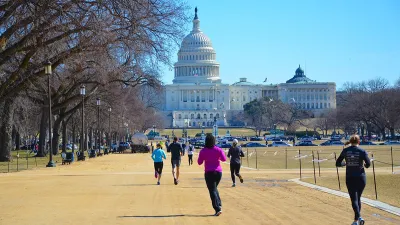While reduced from current levels, the House Appropriations Committee budgeted far more than what President Trump had proposed, but they agreed with him to eliminate the TIGER grant program and reduce transit investments, though by a lesser amount.

While President Trump slashed the 2018 transportation budget by 13 percent in March, the House Appropriations Committee on July 17 voted 31-20 on July 17 to reduce it by 3.7 percent, authorizing $1.5 billion more than what President Trump requested, reports Melanie Zanona for The Hill.
An unsuccessful attempt was made by Rep. Rosa DeLauro (D-Conn.) to restore the Transportation Investment Generating Economic Recovery (TIGER) grant program, which spends about $500 million annually on a wide variety of projects, including transit and bicycle and pedestrian infrastructure, "which are difficult to fund through traditional federal programs," according to DOT. [See last year's list of project awards (pdf).]
We cannot eliminate one of the most important tools we have to improve our roads, our rails and other transportation modes,” she said.
Rep. Mario Diaz-Balart (R-Fla.), chairman of the subcommittee on transportation, housing and urban development, emphasized that the program has never been authorized and was not requested by the administration.
The other major grant program to take a substantial hit is the Capital Investment Grants (CIG) program administered by the Federal Transit Administration. The committee reduced the vital program by $659 million, bringing its total funding to $1.7 billion, a reduction of 28 percent. The panel rejected an amendment from Rep. David Price (D-N.C.), ranking member on the Appropriation subcommittee on transportation, housing and urban development, that would have kept funding at current levels..
In May, the White House pointed to successful November 2016 ballot measures as proof that federal funding was not needed for big ticket transit projects. Los Angeles Metro and the Central Puget Sound Regional Transit Authority jointly responded, defending their need for federal funding. Planetizen posted that month that transit projects lacking a signed federal full funding grant agreement might not receive FY 2017 funding, let alone funding for next year. [See status of current list of transit projects under review by the Federal Transit Administration].
Another amendment by Price to provide $200 billion for additional infrastructure upgrades was offered "to highlight the lack of progress on Trump’s yet-to-be-unveiled infrastructure package" which, not coincidentally, would use $200 billion in public funds, was rejected.
More highlights of the House bill (as reported by Zanona)
- Prohibit funding for high-speed rail in California.
- Provides $100 million in new funding for automated vehicle research and development, which Congress has been increasingly focused on.
- Rejects Trump's proposal to eliminate Essential Air Service and fully maintains the program, which helps provide air service in small and rural communities.
Highlights are also listed on the committee's July 10 press release on the Fiscal Year 2018 Transportation, Housing and Urban Development Funding Bill and the Democrat's "Summary of FY2018 Transportation-HUD Appropriations bill – Committee mark," including:
- $1.42 billion for Amtrak, which is $67 million less than the FY2017 enacted level, a reduction of less than five percent, and $575 million more than the President’s request.
One silver lining to the loss of the TIGER and reduction in the CIG programs is that it would allow for $900 million to be directed to the $20+ billion Amtrak Gateway project. That's three times the funding currently available for the project that includes replacement of the century-old rail tunnels under the Hudson River between Newark Penn Station and New York Penn Station.
New program proposed by Trump
The Trump administration has launched a new Infrastructure For Rebuilding America (INFRA) Grants program that "will make approximately $1.5 billion available to projects that are in line with the Administration’s principles to help rebuild America’s crumbling infrastructure," according to the White House. However, this correspondent did not see it mentioned in the unnumbered House bill or report, accessible from the committee's July 17 press release.
Budget process
While the president proposes a transportation budget, the actual funding is determined by Congress which has the "power of the purse" as defined in the U.S. Constitution. This March Vox article explains the relationship between Trump's budget and what Congress ultimately decides.
One final note on the long-awaited Trump infrastructure plan – it will have to wait longer, reports Zanona on July 20. "Republicans are signaling that a massive rebuilding package, which has long been one of Trump’s top priorities, will most likely have to wait on the sidelines until lawmakers overhaul the tax code."
For text of the unnumbered bill, and a committee report on it, see Appropriation Committee's July 17 press release.
Hat tip to AASHTO Daily Transportation Update. See July 21 AASHTO Journal article on the Appropriation Committee's action.
FULL STORY: House panel backs bill to slash Transportation funding

Analysis: Cybertruck Fatality Rate Far Exceeds That of Ford Pinto
The Tesla Cybertruck was recalled seven times last year.

National Parks Layoffs Will Cause Communities to Lose Billions
Thousands of essential park workers were laid off this week, just before the busy spring break season.

Retro-silient?: America’s First “Eco-burb,” The Woodlands Turns 50
A master-planned community north of Houston offers lessons on green infrastructure and resilient design, but falls short of its founder’s lofty affordability and walkability goals.

Test News Post 1
This is a summary

Analysis: Cybertruck Fatality Rate Far Exceeds That of Ford Pinto
The Tesla Cybertruck was recalled seven times last year.

Test News Headline 46
Test for the image on the front page.
Urban Design for Planners 1: Software Tools
This six-course series explores essential urban design concepts using open source software and equips planners with the tools they need to participate fully in the urban design process.
Planning for Universal Design
Learn the tools for implementing Universal Design in planning regulations.
EMC Planning Group, Inc.
Planetizen
Planetizen
Mpact (formerly Rail~Volution)
Great Falls Development Authority, Inc.
HUDs Office of Policy Development and Research
NYU Wagner Graduate School of Public Service




























